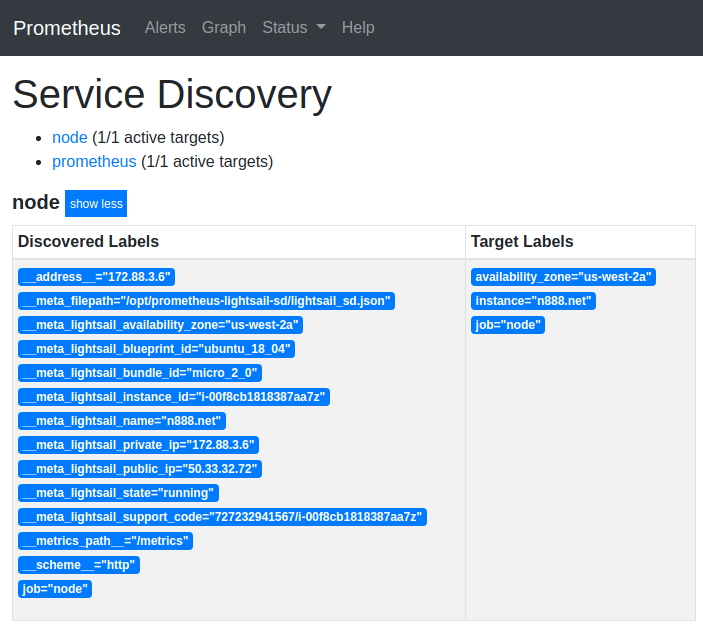Service discovery for the AWS Lightsail platform, compatible with Prometheus.
This project has been integrated into upstream as Prometheus native service discovery:
- https://prometheus.io/docs/prometheus/latest/configuration/configuration/#lightsail_sd_config
- prometheus/prometheus#8693
Thanks to the Prometheus Dev Team.
This service gets the list of servers from the Lightsail API and generates a file which is compatible with the Prometheus file_sd mechanism.
When using AWS credentials or IAM Roles, the following policy needs to be attached to the object:
{
"Version": "2012-10-17",
"Statement": [
{
"Effect": "Allow",
"Action": [
"lightsail:GetInstances"
],
"Resource": [
"*"
]
}
]
}
- After attaching the policy above to the target object, authenticate using one of the three options:
To use an AWS named profile, your profile config should be defined under ~/.aws/config and ~/.aws/credentials.
The profile name can be specified with either:
- Command line argument
--profile=myProfileName - Setting the environment variables
AWS_PROFILE=myProfileName&AWS_REGION=us-east-1
More info: AWS CLI - Named Profiles
Set AWS IAM Key values via environment variables:
- Set the environment variables:
AWS_ACCESS_KEY_IDAWS_SECRET_ACCESS_KEY=EXAMPLEKEYAWS_REGION=us-east-1
This tool supports AWS IAM Roles attached to instances, ie. running in EC2/ECS/etc.
- Note: Lightsail instances do not support IAM Roles, so you must use steps
2aor2b.
Download the binary from the Releases page.
usage: prometheus-lightsail-sd [<flags>]
Tool to generate file_sd target files for AWS Lightsail.
Flags:
-h, --help Show context-sensitive help (also try --help-long and --help-man).
--output.file="lightsail_sd.json"
Output file for file_sd compatible file.
--target.refresh=60 The refresh interval (in seconds).
--profile="" AWS Profile
--web.listen-address=":9888"
The listen address.
--web.telemetry-path="/metrics"
Path under which to expose metrics.
--version Show application version.
$ ./prometheus-lightsail-sd --profile=myProfileName
level=debug ts=2019-11-20T08:56:30.089673118Z caller=main.go:175 msg="loading profile: myProfileName"
level=debug ts=2019-11-20T08:56:30.089986153Z caller=manager.go:224 msg="Starting provider" provider=lightsailSD subs=[lightsailSD]
level=debug ts=2019-11-20T08:56:31.355158911Z caller=main.go:117 msg="get servers" count=2
level=debug ts=2019-11-20T08:56:31.355313346Z caller=main.go:123 msg="server added" source=lightsail/sccbc.net
level=debug ts=2019-11-20T08:56:31.355479273Z caller=main.go:123 msg="server added" source=lightsail/n888.net
See examples/systemd/prometheus-lightsail-sd.service
Here is a Prometheus scrape_config snippet that configures Prometheus to scrape node_exporter (TCP/9100) on discovered instances:
- job_name: node
# This config assumes that prometheus and prometheus-lightsail-sd are started from the same directory:
file_sd_configs:
- files: [ "./lightsail_sd.json" ]
# The relabeling does the following:
# - overwrite the scrape address with the node_exporter's port.
# - add the value of the instance's custom tag named "service".
# - add the availability zone label.
# - overwrite the instance label with the server's name.
relabel_configs:
- source_labels: [__meta_lightsail_private_ip]
replacement: "${1}:9100"
target_label: __address__
- source_labels: [__meta_lightsail_tag_service]
target_label: service
- source_labels: [__meta_lightsail_availability_zone]
target_label: availability_zone
- source_labels: [__meta_lightsail_name]
target_label: instanceThe following meta labels are available on targets during relabeling:
__meta_lightsail_availability_zone="us-west-2a": availability zone__meta_lightsail_blueprint_id="ubuntu_18_04": blueprint id (lightsail pre-baked image)__meta_lightsail_bundle_id="nano_2_0": instance size__meta_lightsail_instance_id="i-00f8cb1818387aa7z": instance id__meta_lightsail_name="n888.net": instance name__meta_lightsail_private_ip="172.88.3.6"instance private ip__meta_lightsail_public_ip="50.33.32.72"instance public ip__meta_lightsail_state="running"instance state__meta_lightsail_support_code="782236961567/i-00f8cb1818387aa7z"instance support code__meta_lightsail_tag_service="frontend"instance tag, each tag gets its own label
note: lightsail.Instance does not return an InstanceId (unlike EC2), but does provide a "support code"
string with the format of "${lightsail_account_id}/${instance_id}". This string is split and the
${instance_id} value is assigned to the `instance_id` meta label.
promu is used for building (https://github.com/prometheus/promu):
Build current arch:
promu build
Build all archs under .promu.yml:
promu crossbuild
Pull requests, issues and suggestions are appreciated.
- Prometheus Authors
- Scaleway Service Discovery
- Core code based on https://github.com/scaleway/prometheus-scw-sd
- aws-sdk-go
Apache License 2.0, see LICENSE.
